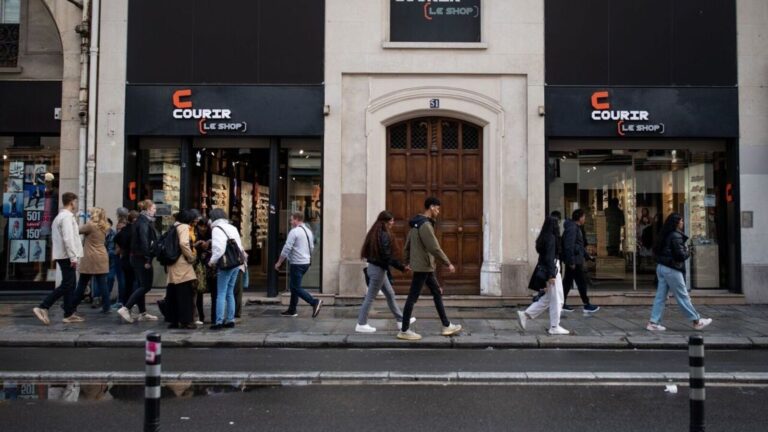French consumers are losing confidence about the future amid a surprise election, posing a new headwind for the country’s fragile economic recovery.
French consumers are losing confidence about the future amid a surprise election, posing a new headwind for the country’s fragile economic recovery.
The French statistics office released a survey on Wednesday showing that the consumer confidence index fell to 89 in June from 90 in May, with 100 representing the long-term average of consumer sentiment. Consumers reported worsening feelings about the quality of life in France over the coming months, as well as their future savings prospects and willingness to make large purchases.
Hello! You’re reading a premium article! Subscribe now to continue reading.
Subscribe now
Premium Benefits
Premium for those aged 35 and over Daily Articles
Specially curated Newsletter every day
Access to 15+ Print Edition Daily Articles
Register-only webinar By expert journalists
E-Paper, Archives, Selection Wall Street Journal and Economist articles
Access to exclusive subscriber benefits: Infographic I Podcast
35+ Well-Researched Unlocks
Daily Premium Articles
Access to global insights
Over 100 exclusive articles
International Publications
Exclusive newsletter for 5+ subscribers
Specially curated by experts
Free access to e-paper and
WhatsApp updates
The French statistics office released a survey on Wednesday showing that the consumer confidence index fell to 89 in June from 90 in May, with 100 representing the long-term average of consumer sentiment. Consumers reported worsening feelings about the quality of life in France over the coming months, as well as their future savings prospects and willingness to make large purchases.
As in the rest of Europe, household confidence was shattered by Russia’s invasion of Ukraine in early 2022. But sentiment has improved this year as price growth has slowed and incomes have started to rise again in real terms. When confidence is higher, households tend to spend more freely, and a recovery in consumer spending has supported growth in each of the past three quarters.
The new drop in trust comes after President Emmanuel Macron plunged France into political turmoil earlier this month by dissolving the National Assembly and calling for fresh parliamentary elections following his party’s crushing defeat in European elections.
The outcome of the vote, with the first round taking place this Sunday and the second a week later, is by no means certain, but it is likely that Macron’s party will lose its position as the strongest in parliament, raising the possibility of a “coexistence” scenario in which the president would be forced to appoint a prime minister from a rival party.
That could be Jordan Bardella, the candidate for the far-right Rally National party, whose leader Marine Le Pen came in second in the past two presidential elections. Bardella has promised to crack down on immigration, including deporting foreign criminals and banning dual French nationals from “strategic” jobs. But Macron’s party is also trailing in opinion polls with the New Popular Front, a center-left coalition that includes the Greens, the Communists and firebrand Jean-Luc Mélenchon’s Unbowed France party.
Across the border in Germany, consumer sentiment darkened further this month, unexpectedly ending a four-month streak of positive sentiment. Like Macron, German Chancellor Olaf Scholz suffered a defeat in European elections after his party trailed the far-right Alternative for Germany. Uncertainty in Europe’s largest economy doesn’t seem to have been dispelled by excitement over the European soccer championships, which began this month, said Carsten Brzeski, head of macro at ING Bank.
“Not even a soccer ball can overcome German wariness,” Brzeski said in the memo.
The worsening sentiment among French and German households contrasts with the upbeat mood among British households, who are also due to hold parliamentary elections early next month.
But in contrast to France, where polls show the opposition Labour Party winning a large majority, the outcome looks more easily predictable.British consumer confidence improved this month after Chancellor Rishi Sunak called a surprise general election, according to a survey published last week by research group GfK.
The drop in French consumer confidence follows the release of a business survey last week that said activity in June weakened as new orders were put on hold pending the election results. Investors are also spooked by the election, and the risk premium for French government bonds has risen relative to other European countries.
Patrick Barbe, head of fixed income at Neuberger Berman, said a victory for the National Rally in the European elections does not guarantee a strong showing at the national level, but the shock for France and the euro zone as a whole could be severe if euroskeptic groups form a majority in parliament, he said in a note.
Write to Joshua Kirby at joshua.kirby@wsj.com; @joshualeokirby
Get all your political news and updates with Live Mint. Download the Mint News app for daily market updates and live business news.

